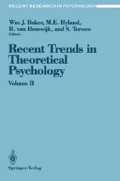Summary
In modern cognitive science the relation of experimental psychology to folk psychology is controversial. But there are some propositions about the explanations folk psychology gives that are generally shared. The main emphasis is laid on a rationalistic account of the structure of mental processes. This view of folk psychology is new and its consequences for cognitive science are challenged by historical forerunners of folk psychology. The example of a hermeneutical psychology discussed heavily in German psychology between the two world wars shows very different opinions on folk psychology. During this period the main points of interest were a theory of individuality and personality that includes emotionality and irrationality. Therefore, one can draw some conclusions for the debate between proponents and opponents of a strong relation of folk psychology to cognitive science. First, folk psychology relies very much on global historical situations and traditions. Second, folk psychology as a social phenomenon may serve as a point of referral for a historical examination of the development of psychology and then offers a possibility to discuss externalistic influences on scientific psychology. But in this case, the inner theoretical reference is abandoned.
Translation by Pamela Jones.
Access this chapter
Tax calculation will be finalised at checkout
Purchases are for personal use only
Preview
Unable to display preview. Download preview PDF.
References
Bühler, K. (1927). Die Krise der Psychologie. Stuttgart: Fischer.
Bumke, O. (1924). Über die gegenwärtigen Strömungen in der Klinischen Psychiatrie. Münchener medizinische Wochenschrift, 71, 1595–1599.
Churchland, P. M. (1981). Eliminative Materialism and Propositional Attitudes. Journal of Philosophy, 78, 67–90.
Churchland, P. S. (1986). Neurophilosophy. Cambridge: Bradford Book.
Fodor, J. A. (1987). Psychosemantics: the problem of meaning in the philosophy of mind. Cambridge: Bradford Book.
Jaeger, S., & Staeuble, I. (1978). Die gesellschaftliche Genese der Psychologie. Frankfurt: Campus.
Jaspers, K. (1923). Allgemeine Psychopathologie (3rd ed.). Berlin: Springer.
Jaspers, K. (1963). Gesammelte Schriften zur Psychopathologie. Berlin: Springer.
Koffka, K. (1925). Psychologie. In M. Dessoir (Ed.), Die Philosophie in ihren Einzelgebieten (pp. 497–603). Berlin: Ullstein.
Kronfeld, A. (1920). Das Wesen der psychiatrischen Erkenntnis. Berlin: Springer.
Pylyshyn, Z. W. (1984). Computation and Cognition. Cambridge: Bradford Book.
Roffenstein, G. (1926). Das Problem des psychologischen Verstehens. Stuttgart: Püttman.
Spranger, E. (1926/1971). Die Frage nach der Einheit der Psychologie. In: Ges. Schriften IV (pp. 1–37). Tübingen: Niemeyer.
Spranger, E. (1932/1971). Männliche Jugend. In: Ges. Schriften IV (pp. 206–262). Tübingen: Niemeyer.
Stich, St. (1983). From Folk Psychology to Cognitive Science. Cambridge: Bradford Book.
Stich, St. (1988). From connectionism to eliminativism. Commentary to: P. Smolensk (1988), On the proper treatment of connectionism. Behavioral and Brain Sciences, 11, 1–74.
Störring, G. (1927). Die Frage der geisteswissenschaftlichen und verstehenden Psychologie. Archiv für die gesamte Psychologie, 58, 389–448.
Editor information
Editors and Affiliations
Rights and permissions
Copyright information
© 1990 Springer-Verlag New York Inc.
About this paper
Cite this paper
Hildebrandt, H. (1990). On the Function of Folk Psychology in the Theory and History of Psychology. In: Baker, W.J., Hyland, M.E., van Hezewijk, R., Terwee, S. (eds) Recent Trends in Theoretical Psychology. Recent Research in Psychology. Springer, New York, NY. https://doi.org/10.1007/978-1-4613-9688-8_41
Download citation
DOI: https://doi.org/10.1007/978-1-4613-9688-8_41
Publisher Name: Springer, New York, NY
Print ISBN: 978-0-387-97311-1
Online ISBN: 978-1-4613-9688-8
eBook Packages: Springer Book Archive

